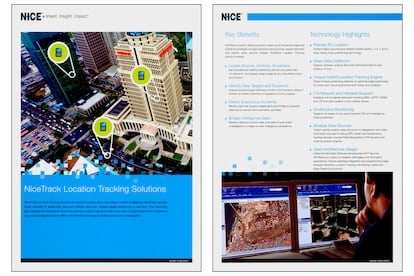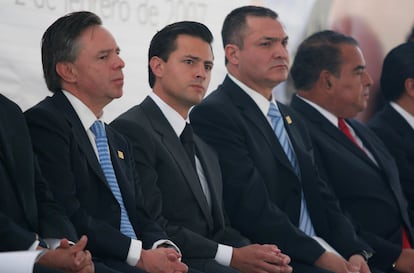García Luna sold spy technology to the Mexican government during the Peña Nieto administration
The former secretary of Public Security profited from lucrative, sole source contracts for location tracking and phone tapping equipment

The reach of Genaro García Luna’s corrupt tentacles throughout the Mexican government is still being discovered. New documents obtained by EL PAÍS show that the secretary for Public Security in the Felipe Calderón administration (2006-2012) was behind lucrative sales of surveillance equipment to the Attorney General’s Office after former President Enrique Peña Nieto took office in 2012. Officials under former Attorney General Jesús Murillo Karam bought phone tapping technology from a company linked to García Luna and then contracted maintenance services for that technology from another company in his corrupt network.
García Luna, who was convicted in February of drug trafficking and organized crime in a New York court, is now facing a civil lawsuit in a Florida court brought by current President Andrés Manuel López Obrador’s administration. García Luna is accused of embezzling hundreds of millions of pesos from the Mexican government through the many contracts between his companies and public agencies. In its lawsuit against García Luna, the Mexican government’s financial intelligence unit (UIF) did not mention the contracts reported here with the Attorney General’s Office that earned him over five million pesos ($250,000) from sole source deals.
A contract shows that García Luna used his influence to sell the Attorney General’s Office a NiceTrack phone surveillance system made by NICE Systems Ltd., which belonged to his front men in the Weinberg family. On November 19, 2013, García Luna landed a deal to maintain that equipment for another of his companies — Nunvav Inc. According to the Attorney General’s Office, NiceTrack was used “for all monitoring of private fixed and mobile telephony.” It justified bypassing the bidding process and awarding the sole source contract to García Luna’s company by claiming an “urgent need… It is of the utmost importance to have a comprehensive support and maintenance service,” states the recently revealed document that was classified as secret for years because of national security.

“The Attorney General’s Office requires the supplier… to maintain absolute confidentiality and not disclose or reveal to any individual or legal entity any of the information contained herein,” states contract number PGR/AD/CN/SERV/159/2013. The company was contracted to provide all the labor and materials for the NiceTrack support and maintenance service. Nunvav was registered in Panama in October 2005, and is the principal company linked to García Luna in the government corruption network investigated by the UIF. NICE Systems Ltd. is the Israeli company that owns the technology patent for the NiceTrack Location Tracking Solution system. In April 2013, Nunvav became the exclusive representative of NICE Systems in Mexico, and Rosalba Tapia Alvarado, the company’s legal representative in Mexico, signed both of the contracts with the Attorney General’s Office.
On November 19, 2013, García Luna landed another contract for Nunvav with the Attorney General’s Office headed by Jesús Murillo Karam, who is now in prison for the Ayotzinapa case (the 2014 abduction and murder of 43 male students from the Ayotzinapa Rural Teachers’ College). The second contract (#160/2013 for $151,000) was for support and maintenance services of another surveillance system — LAGUNA, made by a U.S. company called Spectra Group. R3D, a Mexican digital rights advocacy organization, previously exposed García Luna’s LAGUNA contract after filing a freedom-of-information lawsuit. As of 2021, the Attorney General’s asset inventory included a “Spectra Group network telephony communication server,” valued at 8.6 million pesos ($48,500), according to Mexico’s government transparency website. R3D’s information request to the Attorney General’s Office asked for everything related to the Nunvav contracts, but the recently disclosed contract (159/2013) was not included in the information provided by the authorities. “They lie to us and hide contracts all the time,” said R3D Executive Director Luís Fernando García.
“It’s a good business. And if you’re corrupt, it’s paradise,” said García, who told EL PAÍS services contracts with government security agencies provide companies like Nunvav with a steady source of income for system updates and maintenance. They justify the secrecy around these contracts, “citing national security or law enforcement matters, and benefit from sole source contracts. They also justify wasting large amounts of public money because of the specialized technology involved. Plus, they use the intelligence collected from their spying for their own political and financial gain, and to solidify and abuse power.” García says these contracts are “out of control,” because they “facilitate corruption,” and are “invasions of privacy.”
The García Luna-Weinberg nexus
Genaro García Luna was the point person for the war on drugs during the Calderón administration. He was convicted by a New York jury of accepting millions in bribes from the Sinaloa Cartel when it was led by Joaquín El Chapo Guzmán. In 2021, the UIF filed a civil lawsuit against García Luna in a Florida court, alleging he stole from the Mexican government through contracts signed by his companies and cronies with various government agencies during the Calderón and Peña Nieto administrations. The Mexican government hopes to recover $750 million in public funds channeled through 30 contracts with the Federal Police, the Ministry of the Interior and the Mexico City Prosecutor’s Office between 2009 and 2018.

In the civil lawsuit, the UIF omitted the two contracts awarded by the Attorney General’s Office to García Luna’s companies. Mexican news media has reported that the Attorney General’s Office (now headed by Alejandro Gertz Manero) never supported the UIF lawsuit. The Attorney General even launched an investigation against former UIF director Santiago Nieto for allegedly lacking the authority to represent the Mexican government in a U.S. court. The Gertz-Nieto political rivalry has since played out in public several times.
A key component of the UIF’s lawsuit is García Luna’s relationship with the Weinberg family, which started in the 1980s when García Luna worked for CISEN, the Mexican government’s primary civilian intelligence unit. Mauricio Samuel Weinberg López and his family sell Israeli technology to Latin American countries. Mauricio Weinberg is listed as the owner of Nunvav Inc. along with his son Jonathan Alexis Weinberg Pinto and a partner named Natan Wancier. All three are named in the UIF lawsuit. “Nunvav served as the main conduit for funds illegally diverted from Mexico,” says the UIF lawsuit.
The Weinbergs also played a key role in facilitating García Luna’s move to Florida after leaving public office. The ex-government official lived in luxurious properties owned by his partners and used their yacht. They also supported his application to become a naturalized U.S. citizen, which was in process when he was arrested in Texas in late 2019 to face trial in New York. Weinberg clan members are named repeatedly in the UIF lawsuit as the owners, company directors and front men in over 40 companies used by García Luna’s network to buy luxury cars and million-dollar properties, and as conduits for money sent from Mexico to Barbados, Israel and the United States. Nunvav had a Panamanian subsidiary, Nunvav Technologies Inc., which was also part of the corruption scheme.
With its civil lawsuit, the Mexican government hopes to recover money stolen from public coffers through this network of corruption, bribes and shell companies. The Attorney General’s Office says it also has three other investigations underway into these front companies that not only concealed the money trail to García Luna and other players. The details of the Nunvav contract with the Attorney General’s Office are now known, but the company’s deal with the Israeli technology supplier is still a mystery. “Most likely there were bribes, inflated prices, and many other hidden details,” said Luís Fernando García.
Cutting-edge spy technology
NICE touts its NiceTrack solution as a tool that “transforms location data into mission-critical intelligence” for its clients. The software can collect massive amounts of data in real time and cross-reference tracking information with other data sources like credit card purchases and satellite geolocation (GPS) data without the target noticing. It can also produce a location history for a target, and report on whether he goes to church on Sundays, occasionally sleeps away from home, and where he meets with co-workers. “Location is not trivial [information] — sometimes it says much more than the communications themselves,” said García.
“Locate Anyone, Anytime, Anywhere,” reads one headline in the NiceTrack brochure. The Israeli technology company claims to have contracts with companies and governments in over 150 countries dedicated to reducing crime and preventing terrorism. The NiceTrack Location Tracking solution will help clients “identify new targets and suspects… bridge intelligence gaps… and detect suspicious incidents.” By the time García Luna stepped down as secretary of Public Security in December 2012, the ministry used the Israeli company’s technology extensively. It purchased NiceTrack from the Weinbergs in 2009 through three contracts that covered the software and peripheral equipment, as well as installation and support services.
Spectra Group’s LAGUNA system is a tool for intercepting radio transmissions and telephone signals in real time. The most recent version promises an “extraordinary 99.9% success rate.” The company’s website says the sale of its product is “explicitly restricted to qualified law-enforcement agencies, government entities, and military intelligence, only.” In November 2012, shortly after the change in government, Nunvav won a contract with the department of Security (still headed by García Luna) for LAGUNA support and maintenance services, similar to the contract it would sign a year later with the Attorney General’s Office, although at a much higher price. The Ministry of Public Security paid $12 million to García Luna’s company and its front men for that contract. Other contracts have yet to see the light of day. “We have only seen the tip of the iceberg,” said Luís García.
Sign up for our weekly newsletter to get more English-language news coverage from EL PAÍS USA Edition
Tu suscripción se está usando en otro dispositivo
¿Quieres añadir otro usuario a tu suscripción?
Si continúas leyendo en este dispositivo, no se podrá leer en el otro.
FlechaTu suscripción se está usando en otro dispositivo y solo puedes acceder a EL PAÍS desde un dispositivo a la vez.
Si quieres compartir tu cuenta, cambia tu suscripción a la modalidad Premium, así podrás añadir otro usuario. Cada uno accederá con su propia cuenta de email, lo que os permitirá personalizar vuestra experiencia en EL PAÍS.
¿Tienes una suscripción de empresa? Accede aquí para contratar más cuentas.
En el caso de no saber quién está usando tu cuenta, te recomendamos cambiar tu contraseña aquí.
Si decides continuar compartiendo tu cuenta, este mensaje se mostrará en tu dispositivo y en el de la otra persona que está usando tu cuenta de forma indefinida, afectando a tu experiencia de lectura. Puedes consultar aquí los términos y condiciones de la suscripción digital.








































